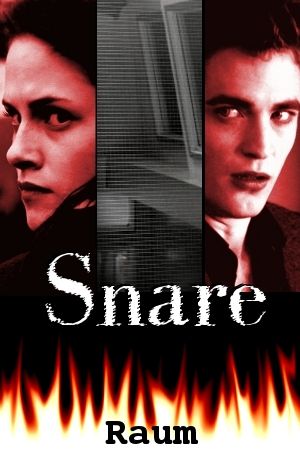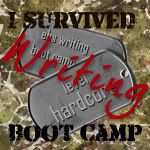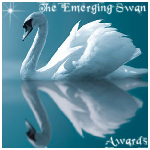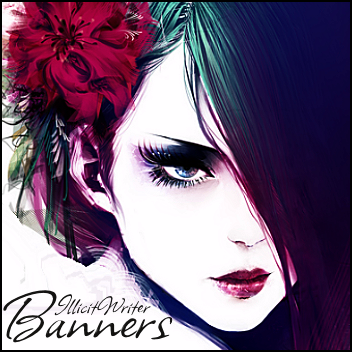I had the pleasure to review Cesca Marie's most known work (in the Twilight fandom), Dead on my feet, on this blog; then I read also other short stories by her and I found all of them absolutely amazing.
I love the way she can make her readers laugh and cry on the same page, the way she develops her characters, her witty and insightful dialogues...I believe that she could give inspiring answers to so many different writing questions!
This time, let's discuss with her the opening hook of a story.
I guess that the following post will be surprising not only because of the rich and various contents that Cesca Marie put in it, but also because it's so well written and argumented that it could be a writing lesson itself. Enjoy!
We’re talking about beginnings in this Writing Lab. The subject interests me in terms of fanfiction, because it is a totally unique process of writing with its own styles, conventions, etc. When it comes to original fiction, writers revise their manuscripts to death. With fanfiction, most stories only get a beta and a preread, if that. Beginnings aren’t considered as important as the quality of the prose overall, or the originality of the plot. Let me try to convince you that beginnings are important to fanfiction too, even if the result is positive feedback instead of a royalties cheque.
For some writers fanfiction is a hobby. Others want to take what they learn from writing fanfiction and apply it to original fiction. Not every technique or style that works in fanfiction will cross over into original writing, but one thing that does matter to both types of writing is the story’s opening hook.
Reading fanfiction is a highly democratic activity. If you don’t like a story’s first chapter, you can quite easily move on to another of the thousands of fics available on fanfiction.net alone, to say nothing of other archives. The sheer volume of stories available is why it’s important for writers to compose a compelling beginning that engages readers from the very first sentence—to differentiate oneself from the pack. A bored reader is a lost reader, and most will mosey on without leaving any feedback. Writing an engaging beginning is a skill that will transfer over to original writing, too. When you submit queries and samples to literary agents and publishers, the future of your writing career rests on the first five to ten pages alone. Time constraints aside, the logic of the print industry is that if a story’s beginning is not compelling, the rest of the novel won’t be, either.
There are thousands of blog posts and websites dedicated to helping writers strengthen the first five pages of a manuscript. There are also guides such as Noah Lukeman’s The First Five Pages: A Writer’s Guide to Staying Out of the Rejection Pile. These can help if you’re already writing original fiction, or plan to in the near future, but for now I’ll focus on how this topic applies to fanfiction.
Go back to your Favorites list and take a look at your top five fics. Examine the features of the stories’ beginnings. Are they strong or weak? Unique, or clichéd? Think about whether these beginnings sucked you in, or whether you had to give the story the benefit of the doubt for a few paragraphs or chapters, waiting for it to get good.
I’ll use two examples from my personal Favorites list. I’ve used non-Twilight stories so it doesn’t seem like I’m singling out any particular writer/ship/genre in this fandom.
Before the Dawn by snarkyroxy (Harry Potter ‘verse)
What is good about it is the diction. Snarkyroxy uses lively language and doesn't spam adjectives or repeat phrases.
Not My King by aroar11 (Fairy Tales ‘verse)
This is the kind of opening hook that sells original fiction and grabs fanfiction readers from the first line. It begins in medias res(2) and with a focalized perspective. The action is immediate. There are no details to set the scene; aroar11 does not burden the reader with details that you absolutely need to know in order to understand the story; the reader is an observer, not a confidante of a sentimental narrator. Figuring out what is going on is half the fun of reading. It’s a great example of a strong introduction because the very first sentence grabs the reader by the lapels and makes him/her want to keep reading.
It sounds so easy, right? Just write a brilliant opening hook. I wanted to take on this topic for the Writing Lab because it is my personal Everest. I hate writing opening hooks. They suck. They require something that you cannot possibly fake—genuine inspiration. I’ve found my own ways to cope with the challenge, but a compelling beginning is always going to be damn hard to come by.
One approach: don’t get too attached to your introductions. For almost everything I’ve written (fanfiction, poetry, short stories, novels, articles, academia), I have ended up scrapping and rewriting the introduction (3). Sometimes I even rewrite the whole first chapter. I have a better idea of what the piece is about when I’ve finished writing than I did when I started, so writing the beginning after everything else tends to improve the project.
Dead On My Feet was the first project for which I did not do this. I fully intended to, but after ten chapters when I looked back on the beginning, I still liked it. I only changed one verb. Sometimes your first scribblings will be workable prose, but don’t bank on it.
Another strategy is to give the first page of your story to an acquaintance. Ask him/her to read it and to tell you what he/she understands about the situation/characters/conflict from the introduction alone. Ask what parts your reader skimmed (and promptly trim the fat). Basically, discover if your opening conveyed what you intended for it to convey. It not, rewrite. And finally, the most important thing to ask your reader: would you continue on to page two? Why [not]?
It can be nerve wracking to give your story to someone who hasn’t read your full draft, or participated in your discussions of the writing process, but it’s still important. You can’t trust your own perceptions of the work; you’re just too close to it, even when you try to put yourself in the readers’ shoes. The folks you’ve brainstormed with or given partial drafts to are similarly biased. Find someone who has no investment in your emotions or at work—someone with whom you have no professional relationship. The feedback you get will be invaluable.
Furthermore, if you spotted the Coleridge reference, I will love you forever.
(1) Some literary agents dislike a beginning where a character is alone, thinking. Consider this if you write original fiction, but also consider if you really enjoy reading this type of beginning in fanfiction or books. If you really like what your ideal agent loathes, make yourself happy and find a new agent to query.
(2) Trans.: into the middle of things.
(3) I mean it. I wrote the introduction to this Writing Lab only after composing the first draft.
As an author, what do you think about the opening hooks of your stories?
As a reader, is there an opening hook that you'd like to discuss because you found it particularly well/badly written?
As usual, your comments are welcome!
I love the way she can make her readers laugh and cry on the same page, the way she develops her characters, her witty and insightful dialogues...I believe that she could give inspiring answers to so many different writing questions!
This time, let's discuss with her the opening hook of a story.
I guess that the following post will be surprising not only because of the rich and various contents that Cesca Marie put in it, but also because it's so well written and argumented that it could be a writing lesson itself. Enjoy!
We’re talking about beginnings in this Writing Lab. The subject interests me in terms of fanfiction, because it is a totally unique process of writing with its own styles, conventions, etc. When it comes to original fiction, writers revise their manuscripts to death. With fanfiction, most stories only get a beta and a preread, if that. Beginnings aren’t considered as important as the quality of the prose overall, or the originality of the plot. Let me try to convince you that beginnings are important to fanfiction too, even if the result is positive feedback instead of a royalties cheque.
For some writers fanfiction is a hobby. Others want to take what they learn from writing fanfiction and apply it to original fiction. Not every technique or style that works in fanfiction will cross over into original writing, but one thing that does matter to both types of writing is the story’s opening hook.
Reading fanfiction is a highly democratic activity. If you don’t like a story’s first chapter, you can quite easily move on to another of the thousands of fics available on fanfiction.net alone, to say nothing of other archives. The sheer volume of stories available is why it’s important for writers to compose a compelling beginning that engages readers from the very first sentence—to differentiate oneself from the pack. A bored reader is a lost reader, and most will mosey on without leaving any feedback. Writing an engaging beginning is a skill that will transfer over to original writing, too. When you submit queries and samples to literary agents and publishers, the future of your writing career rests on the first five to ten pages alone. Time constraints aside, the logic of the print industry is that if a story’s beginning is not compelling, the rest of the novel won’t be, either.
There are thousands of blog posts and websites dedicated to helping writers strengthen the first five pages of a manuscript. There are also guides such as Noah Lukeman’s The First Five Pages: A Writer’s Guide to Staying Out of the Rejection Pile. These can help if you’re already writing original fiction, or plan to in the near future, but for now I’ll focus on how this topic applies to fanfiction.
Go back to your Favorites list and take a look at your top five fics. Examine the features of the stories’ beginnings. Are they strong or weak? Unique, or clichéd? Think about whether these beginnings sucked you in, or whether you had to give the story the benefit of the doubt for a few paragraphs or chapters, waiting for it to get good.
I’ll use two examples from my personal Favorites list. I’ve used non-Twilight stories so it doesn’t seem like I’m singling out any particular writer/ship/genre in this fandom.
Before the Dawn by snarkyroxy (Harry Potter ‘verse)
The corridors of Hogwarts School of Witchcraft and Wizardry were silent and cold as Hermione Granger stopped to examine a portrait she had never seen before. After nearly seven years at the school, and many more explorations of its infinite corridors than most of her classmates, she never ceased to be surprised how little she knew of the place.
After three months as Head Girl, her nightly patrols were still leading her to parts of the school she had never seen before. Only a few nights ago, she has discovered a small room with a floor-to-ceiling window of stained glass which would humble the most beautiful Muggle cathedrals. She had stared at the window for a good hour, making out the shapes and lines in the semi-darkness. The window depicted the creation of the school, and the subsequent breaking of the friendship between Salazar Slytherin and the three other founders.The action of the story picks up three short paragraphs after the last line quoted. Too long by standards of original fiction (1). The introduction presents the reader with a character, explains the recent past, and gives superfluous details about the setting that only serve to establish an atmosphere of peace—right before snarkyroxy shatters it with action. As fanfiction beginnings go, this one is pretty standard. It’s not very strong in the sense that it lingers over details that won’t matter (and will be forgotten) as soon as the action starts three paragraphs later.
What is good about it is the diction. Snarkyroxy uses lively language and doesn't spam adjectives or repeat phrases.
Not My King by aroar11 (Fairy Tales ‘verse)
And then he saw it too: Arthur standing tall, holding in his hand the great sword of ages.
He forgot Saladin and his horsemen, still as statues on the meadow. He forgot the blood that was pouring from his own neck, and the useless objects that had once been his hands, and the pain that burned through his body like a living thing. He forgot that he was about to die.
"My king,'' he whispered.
For a moment the field was utterly silent. Not a whisper of the breeze, not the chirping of a single insect. It was the silence of time turning backward. And then, ringing across the rolling hills came Arthur's command, rough with tears and pain and loss:
"To arms! Your king calls you to arms!''
This is the kind of opening hook that sells original fiction and grabs fanfiction readers from the first line. It begins in medias res(2) and with a focalized perspective. The action is immediate. There are no details to set the scene; aroar11 does not burden the reader with details that you absolutely need to know in order to understand the story; the reader is an observer, not a confidante of a sentimental narrator. Figuring out what is going on is half the fun of reading. It’s a great example of a strong introduction because the very first sentence grabs the reader by the lapels and makes him/her want to keep reading.
It sounds so easy, right? Just write a brilliant opening hook. I wanted to take on this topic for the Writing Lab because it is my personal Everest. I hate writing opening hooks. They suck. They require something that you cannot possibly fake—genuine inspiration. I’ve found my own ways to cope with the challenge, but a compelling beginning is always going to be damn hard to come by.
One approach: don’t get too attached to your introductions. For almost everything I’ve written (fanfiction, poetry, short stories, novels, articles, academia), I have ended up scrapping and rewriting the introduction (3). Sometimes I even rewrite the whole first chapter. I have a better idea of what the piece is about when I’ve finished writing than I did when I started, so writing the beginning after everything else tends to improve the project.
Dead On My Feet was the first project for which I did not do this. I fully intended to, but after ten chapters when I looked back on the beginning, I still liked it. I only changed one verb. Sometimes your first scribblings will be workable prose, but don’t bank on it.
Another strategy is to give the first page of your story to an acquaintance. Ask him/her to read it and to tell you what he/she understands about the situation/characters/conflict from the introduction alone. Ask what parts your reader skimmed (and promptly trim the fat). Basically, discover if your opening conveyed what you intended for it to convey. It not, rewrite. And finally, the most important thing to ask your reader: would you continue on to page two? Why [not]?
It can be nerve wracking to give your story to someone who hasn’t read your full draft, or participated in your discussions of the writing process, but it’s still important. You can’t trust your own perceptions of the work; you’re just too close to it, even when you try to put yourself in the readers’ shoes. The folks you’ve brainstormed with or given partial drafts to are similarly biased. Find someone who has no investment in your emotions or at work—someone with whom you have no professional relationship. The feedback you get will be invaluable.
Furthermore, if you spotted the Coleridge reference, I will love you forever.
(1) Some literary agents dislike a beginning where a character is alone, thinking. Consider this if you write original fiction, but also consider if you really enjoy reading this type of beginning in fanfiction or books. If you really like what your ideal agent loathes, make yourself happy and find a new agent to query.
(2) Trans.: into the middle of things.
(3) I mean it. I wrote the introduction to this Writing Lab only after composing the first draft.
As an author, what do you think about the opening hooks of your stories?
As a reader, is there an opening hook that you'd like to discuss because you found it particularly well/badly written?
As usual, your comments are welcome!



























I am not a reader of Cesca Marie because I don't read AH, as a rule, with very few exceptions. But surely she seems to know her stuff. This is a lesson to remember. Obviously writing in installments is quite different than writing a book. The first chapter is essential, if you want the readers putting you on alerts. And we use a disproportionate amount of cliffhangers for the same reason. On paper it has happened to me often that the first chapters were not that enticing, but then the story grew on me and I did finish the book. This would not have happened if it was a first chapter published on line. I would have not continued reading. For this reason I can't tell you about bad hooks. They are gone and forgotten. Good hooks.. they are too many. Here is the most recent. (I can't copy it, just go there: Vampires and lovers and Hollywood, Oh my by Collegemomma on Twilighted.net). The first half page got me; Edward is an actor and a vampire. Totally preposterous and I was totally hooked. And it is only chapter 1, sigh.
ReplyDeleteAs for myself, I am proud of the beginning of "The Parachutist":
"The German soldier emits just a low gurgle when Caputo slits his throat. The other German, the one I felled with my useless carbine’s butt, is still breathing, however. Caputo gives me a very hard stare, then proceeds to do what I am obviously reluctant to do myself and dispatches him. I try not to wince and help my comrade to bury the bodies under a pile of rubble inside the bombed house".
I wanted to give the idea of a war story and that was it.
This was very useful...thank you! I feel like the begining of my first fic...bad hook...but the latest ones have been much better...but I couldn't say why...after reading this, I can pin ppint easier what I did right and what I did wrong...will help for future stories :)
ReplyDeleteHi ContentedTwiCow!
ReplyDeletethank you for your comment!
- Raum